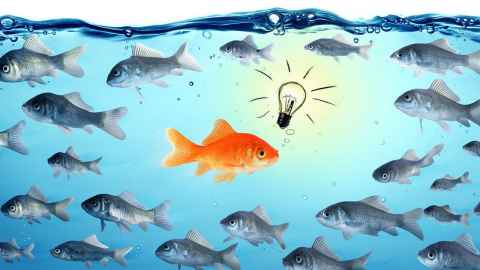Think like a fish: an ocean-centric vision
25 June 2024
On day two of the Association of Pacific Rim Universities meeting in Auckland, a lunch-time talk by Dr Dan Hikuroa challenges people to 'think like a fish'.

What if we thought of climate change from the vantage point of other life forms – perhaps a dog, the ocean, the stars, trees, a bird, or a fish?
That notion, suggested by Samoa’s former head of state, Tui Atua Tupua Tamasese Taʻisi Efi, is central to a lunchtime talk by Associate Professor Dan Hikuroa (Ngāti Maniapoto, Waikato-Tainui, Ngati Whanaunga, Pākehā) on 25 June at the 28th Annual Presidents’ Meeting of the Association of Pacific Rim Universities.
The theme of the APRU meeting, hosted by Waipapa Taumata Rau, University of Auckland, is ‘The World’s Challenges Divide Us, the Ocean Currents Connect Us’. Around 130 delegates from the Americas, Asia and Australasia are congregating for the three-day event from 24-26 June.
In Pacific oceanic philosophies, relationships between the cosmos, ancestors, humans, and animals are sacred and intertwined.
Since colonial times, a struggle between `thinking like a master,’ in which the sea and its inhabitants are understood as resources for human uses, and ‘thinking like a fish,’ one oceanic life form among many, has been ongoing in the Pacific, and around the planet, says Hikuroa.
Initiatives driven by Māori have created spaces for thinking about rivers, forests and mountains differently ...
Presupposing the fundamental interconnection of all living beings and planetary systems and considering existential challenges from the vantage point of a fish, or a bird, or a forest, or a river can provide alternatives to extractive, anthropocentric perspectives, he says.
Novel governance experiments of this kind have been happening in Aotearoa New Zealand: Te Urewera Act of 2014 and Te Awa Tupua Act of 2017, which gave a forest and a river legal personhood.
“These initiatives driven by Māori have created spaces for thinking about rivers, forests and mountains differently, valuing them as holistic, historical and cultural entities with lives and rights of their own,” says Hikuroa.
“These build upon relational understandings of rivers, forests and mountains as entities that are more ancient and powerful than people, viewing rivers as the lifeblood and forests as the lungs of society and the land.”
Also speaking at the same lunchtime talk is University of Auckland marine scientist, Professor Simon Thrush.
His talk will look at the importance of marine ecosystems in tackling the “trifecta of challenges we face: biodiversity, sustainability and climate change”.
APRU delegates from around the world are considering the impacts of climate change on oceans and the implications for communities and Indigenous populations, climate justice, food and water security.
APRU comprises leading universities from 18 economies of the Pacific Rim known worldwide for their academic and research excellence.
About APRU
The APRU is an alliance of universities comprising 61 higher education institutions from 18 countries within the Pacific Rim. It was established in 1997 to bring together thought leaders, researchers, and policymakers to exchange ideas and collaborate on practical solutions to the region’s challenges to contribute to economic, scientific, and cultural development. The University of Auckland was an early member and Vice-Chancellor Professor Dawn Freshwater is the APRU vice-chair.
Media Enquiries
Email: mediateam@auckland.ac.nz